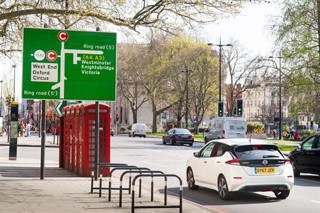London’s “anti-car” transport policies could jeopardise the capital’s COVID-19 recovery according to critics of a push towards cycling and walking as coronavirus lockdown measures are eased.
The London congestion charge and ultra-low emission zone (ULEZ) have been reintroduced from today (May 18), just over a month before the congestion charge’s planned June 22 increased from £11.50 to £15 per day including weekends.
AM’s sister title, Fleet News, reported that cash-strapped Transport for London (TfL) announced it was re-activating both schemes despite securing a £1.6 billion bailout from the Government last week.
As well as the introduction of weekend congestion zone charging, and the increased price from next month, the scheme’s operating hours will be temporarily increased, extending its daily limit from 6pm to 10pm.
Vertu Motors chief executive, Robert Forrester, described the move as “Sadiq Khan’s (pictured) radical anti-car plan for London”, adding that it was “just the beginning”.
He added: “This is big news for the auto sector with no arguing the case for the excellent, environmentally friendly new cars that are available and provide individuals with mobility freedom.”
London’s early hard-line stance on vehicle charging could come as a blow to car retailers across the UK who are hoping that an aversion of crowded modes of public transport could help drive the recovery of car sales as lockdown restrictions are eased – a possibility according to research conducted by Auto Trader.
The move to encourage walking and cycling comes seven months after the Mayor of London, Sadiq Khan, encouraged low-income and disabled Londoners into lower emitting new vehicles with the extension of the capital’s £2,000 vehicle scrappage allowance scheme.
Gareth Powell, TfL’s managing director for surface transport, claimed that greater levels of walking and cycling in central London would be vital to the capital’s re-start, adding that the reintroduction of the vehicle charges would ensure it remained the “greener, cleaner place” it had become during lockdown.
Natalie Chapman, head of urban policy at the Freight Transport Association (FTA) insisted that the decision will have a detrimental impact on the fleet industry’s efforts to help re-start the capital’s economy.
She said that “Logistics businesses are fully committed to assisting the restart of London’s economy” but added that the reintroduction and extension of current roads charging legislation “could actually have a detrimental effect on that work”.
Chapman said: “Cash-hit operators that have not been able to work for the past eight weeks are themselves working hard to recover their own business finances but having to accommodate additional road charges will penalise that growth significantly.”


















Login to comment
Comments
No comments have been made yet.